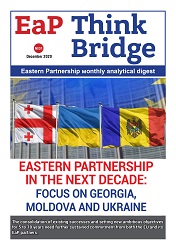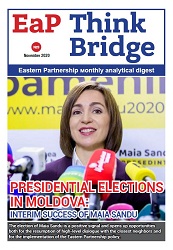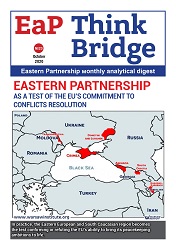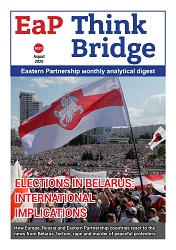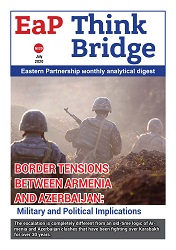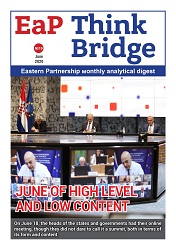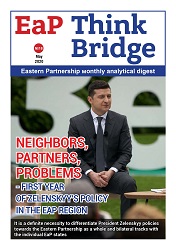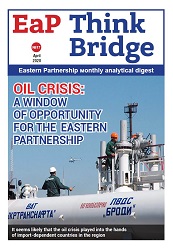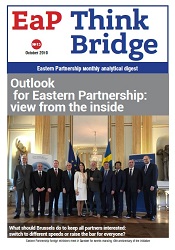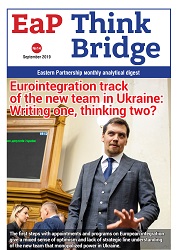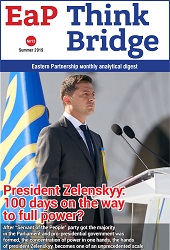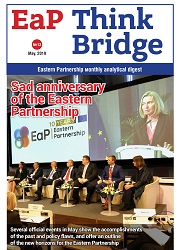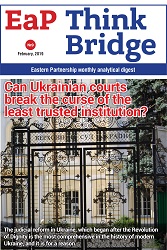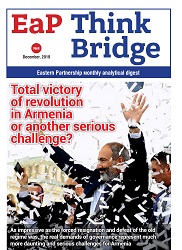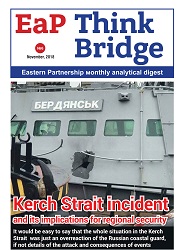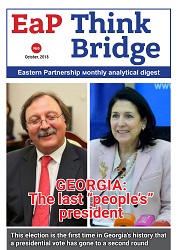EAP Think Bridge - № 2019-09 - Can Ukrainian courts break the curse of the least trusted institution?
Author(s): Richard Giragosian,Sevinç Aliyeva,Yuri Tsarik,Lasha Tughushi,Serhiy Herasymchuk,Natalia Stercul,Mykhailo Zhernakov / Language(s): English
Court is the least trusted Ukrainian public institution. The situation is far from unique for other countries of the Eastern Partnership. In the five years after the Revolutionof Dignity there have been tremendous changes in thejudicial system of Ukraine, key laws have been adopted, new bodies are being formed. Nevertheless, expertsbelieve that out of all the “20 deliverables of the EasternPartnership until 2020” the progress is the most modestin this particular sphere. Why the European experience does not work well in the Ukrainian context and what alternative recipes independent experts have to offer, Mikhail Zhernakov analyzed.The lessons of Ukraine will be useful for other countries in the region where the reform of the judicial system also stumbles over the old schemes or is only being planned. For example, in Georgia heated debates around this topic in February led to the collapse of the constitutional majority in the parliament. In Armenia the judicial systems will soon be able to demonstrate all its glory, when high-profile criminal cases against the former ruling elite come to trial. In February new charges were pressed against the Ex-President Robert Kocharian, his son Serdak and the brother of another ex-President Alexander Sargsyan. In Moldova, meanwhile, another state system - the electoral one – was tested. Experts believe that in many respects precisely because of the new mixed electoral system the parliamentary elections in the country did not bring the long-awaited peace. Neither single party won a majority, and no matter what the coalition will look like, Moldova remains in a precarious position. The Belarusian president is still preparing for the upcoming elections, again openly relying largely on security forces and offering citizens a simple social contract: independence in exchange for loyalty. In Ukraine, the elections are already around the corner. This time they will be held without Russian observers. The respective law to ensure it was adopted in February. In the meantime, before voting for the president of the country, the authorities received a powerful blow to their reputation: journalists unveiled corruption in defense. Whether this information will influence the choice of Ukrainians will become clear at the end of March. //// CONTENT: “New Armenia” nears one-year mark // Azerbaijan: Inflation rate on the rise // Belarus: Preparation for elections and “freezing” of integration with Russia // Georgia: $17 mn banking scandal // Moldova: Elections are over, what’s next? // Ukraine: Economic calm and political storm // Analytica: Major trends in Moldova’s parliamentary election // Can Ukrainian courts break the curse of the least trusted institution?Court is the least trusted Ukrainian public institution. The situation is far from unique for other countries of the Eastern Partnership. In the five years after the Revolution of Dignity there have been tremendous changes in the judicial system of Ukraine, key laws have been adopted, new bodies are being formed. Nevertheless, experts believe that out of all the “20 deliverables of the Eastern Partnership until 2020” the progress is the most modest in this particular sphere. Why the European experience does not work well in the Ukrainian context and what alternative recipes independent experts have to offer, Mikhail Zhernakov analyzed. The lessons of Ukraine will be useful for other countries in the region where the reform of the judicial system also stumbles over the old schemes or is only being planned. For example, in Georgia heated debates around this topic in February led to the collapse of the constitutional majority in the parliament. In Armenia the judicial systems will soon be able to demonstrate all its glory, when high-profile criminal cases against the former ruling elite come to trial. In February new charges were pressed against the Ex-President Robert Kocharian, his son Serdak and the brother of another ex-President Alexander Sargsyan. In Moldova, meanwhile, another state system - the electoral one – was tested. Experts believe that in many respects precisely because of the new mixed electoral system the parliamentary elections in the country did not bring the long-awaited peace. Neither single party won a majority, and no matter what the coalition will look like, Moldova remains in a precarious position. The Belarusian president is still preparing for the upcoming elections, again openly relying largely on security forces and offering citizens a simple social contract: independence in exchange for loyalty. In Ukraine, the elections are already around the corner. This time they will be held without Russian observers. The respective law to ensure it was adopted in February. In the meantime, before voting for the president of the country, the authorities received a powerful blow to their reputation: journalists unveiled corruption in defense. Whether this information will influence the choice of Ukrainians will become clear at the end of March. //// CONTENT: “New Armenia” nears one-year mark // Azerbaijan: Inflation rate on the rise // Belarus: Preparation for elections and “freezing” of integration with Russia // Georgia: $17 mn banking scandal // Moldova: Elections are over, what’s next? // Ukraine: Economic calm and political storm // Analytica: Major trends in Moldova’s parliamentary election // Can Ukrainian courts break the curse of the least trusted institution?
More...
